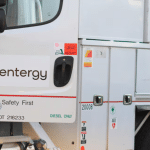The following story was written by Matthew Nicaud with the Mississippi Center for Public Policy
In a day when high-tech farming and agriculture are growing in importance, high-speed internet technology is becoming an important tool for farmers across the country. Emerging mobile internet could play a key part in getting farms connected and expanding their capacity.
In order for agricultural implements to be connected to the internet, mobile connectivity is a critical component. Wired broadband infrastructure (such as fiber) is not always available in rural areas. But mobile internet connectivity is essential for elements such as tractors, drones, and other tools that may be outside the reach of a wired connection.
A relatively high amount of bandwidth is required for mobile internet connections to achieve their highest potential for agricultural use. While the widely available 4G mobile internet technology common in cell phones allows for some applications, 4G was originally designed for private consumer use in cell phones. Thus, it is not as ideal for commercial applications, such as agriculture.
With speeds that are usually slower than a wired internet connection but relatively responsive, 4G is ideal for personal use such as checking social media, watching a quick video, or sending an email. But the technology doesn’t always carry the bandwidth that is needed in a commercial context.
But the exponential growth of 5G is expanding mobile connectivity capabilities, which carries some exciting possibilities for agricultural technology. What is 5G? 5G stands for “5th Generation” since it is the fifth generation of mobile internet technology. Unlike 4G technology, 5G technology provides the opportunity for mobile connectivity that meets or exceeds most wired internet speeds.
For agricultural use, 5G has numerous applications that are continually expanding. For instance, 5G can power automated sensors that determine soil and crop status. The correct application of fertilizer can then be applied to specific areas of the fields.
Tractors, powered by 5G, can utilize artificial intelligence to assess crop health and detect weeds to apply precision herbicide. Drones, powered by 5G, can assess pests and specifically target areas that need pesticides. For livestock, 5G-powered tracking devices can track herd movements. The speed of 5G can be used to upload photos of dairy stock to analyze their health by artificial intelligence systems. When it comes to agriculture and 5G, quite literally, the sky is the limit.
As farmers utilize the enterprise-level speeds of 5G, they will be able to monitor the ever-changing variables of agriculture more effectively. These emerging capabilities could have a tangible impact on greater efficiency, higher yields, and increasing profit margins for agriculture.
America’s 5G internet infrastructure is building up at a rapid rate. Farmers, investors, and policy makers would do well to be prepared so that the industry can hit the ground running as 5G technology becomes increasingly available.







